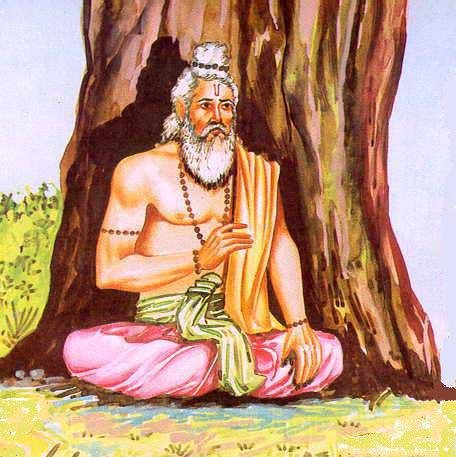Explore Gotras

Rishi Bharadvaja is one of the Saptarishi (Seven Great Sages) in Hindu mythology and is renowned for his profound knowledge, wisdom, and his role as a spiritual leader in ancient India. He is one of the most revered sages and the patriarch of the Bharadvaja Gotra, which is considered one of the most prominent Gotras in Hindu society. His contributions to the Vedas, spiritual teachings, and mythological stories make him a central figure in Hindu tradition.
1. Origins and Lineage
Bharadvaja in the Saptarishi:
Bharadvaja is counted among the Saptarishi of the Treta Yuga (the second of the four Yugas in Hindu cosmology). The Saptarishis were the seven great sages who were created by Lord Brahma to maintain and preserve divine knowledge and wisdom throughout the ages. As one of the most significant Saptarishis, Bharadvaja is revered for his profound wisdom and spiritual leadership.Parents:
Rishi Bharadvaja was the son of Devarata (a great sage) and Mamata (sometimes identified as Aditi, in some texts). His birth was considered divine, and he was born under auspicious and mystical circumstances. Bharadvaja was a child prodigy, deeply knowledgeable in Vedic wisdom from a very young age.
2. Contributions to the Vedas
Vedic Contributions:
Rishi Bharadvaja is credited with composing several hymns in the Rigveda, particularly in the Bharadvaja Shakha (the branch of the Rigveda associated with him). His hymns were mainly dedicated to Agni (the fire god) and Indra (the king of gods), focusing on sacrifices, rituals, and divine worship. Bharadvaja’s hymns play an essential role in establishing the rituals of Vedic yajnas (sacrificial offerings).The Bharadvaja Sutra:
Rishi Bharadvaja is also credited with creating the Bharadvaja Sutra, a text that provides insights into Vedic rituals, spiritual practices, and the use of mantras. This Sutra emphasizes the link between the physical and spiritual worlds and the importance of sacrifice and prayers.
3. Rishi Bharadvaja’s Role in Hindu Mythology
The Story of Bharadvaja’s Birth:
According to various mythological accounts, Bharadvaja’s birth is considered mystical and divine. He was born from Devarata and Mamata, and his arrival marked the beginning of a spiritual legacy that would guide future generations in Vedic rituals and spiritual wisdom.Bharadvaja’s Wisdom:
Bharadvaja was known for his great spiritual wisdom, and he passed down this knowledge through his teachings. His works influenced the development of Vedic philosophies and rituals, making him a central figure in the spiritual world.
4. Bharadvaja in the Hindu Epics
In the Mahabharata:
Bharadvaja’s most famous connection is through his son, Drona, a key character in the Mahabharata. Drona was the teacher of the Pandavas and Kauravas in the martial arts, particularly archery. Drona’s wisdom and training were instrumental in shaping the warriors of the Kuru kingdom.- Drona’s Role:
Drona was a great warrior and teacher, and his teachings were rooted in the wisdom of his father, Bharadvaja. The Pandavas and Kauravas, under Drona’s guidance, learned the arts of warfare, which would later play a decisive role in the Kurukshetra War.
- Drona’s Role:
In the Ramayana:
Although Bharadvaja’s role is less prominent in the Ramayana, he is mentioned as an important sage who provided spiritual guidance to the royal family of Ayodhya. Bharadvaja’s teachings helped the rulers of Ayodhya in upholding dharma and spiritual righteousness.In the Puranas:
Bharadvaja is frequently mentioned in the Puranas, where his spiritual knowledge, his contributions to rituals, and his role in shaping Vedic traditions are acknowledged. He is also described as a key figure in the Vedic cosmology and the practice of dharma.
5. The Bharadvaja Gotra
The Bharadvaja Gotra:
The Bharadvaja Gotra is one of the most respected Gotras in Hindu society. Individuals belonging to this Gotra trace their lineage back to Rishi Bharadvaja, who is seen as the patriarch of the family. The Gotra is significant not only for its spiritual connection to Bharadvaja but also for its association with Vedic knowledge, rituals, and ethical practices.Marital Practices:
The Gotra is important in traditional Hindu marriage customs, where individuals from the same Gotra are generally not allowed to marry. This is due to the belief that people from the same Gotra are spiritually related, tracing their lineage back to the same sage.
6. Bharadvaja’s Influence and Legacy
Spiritual Teachings:
Bharadvaja’s spiritual wisdom and teachings on rituals, prayers, and cosmic law (dharma) remain influential to this day. His contribution to Vedic traditions, his insights into spiritual discipline, and his emphasis on the importance of sacrifice are central to Hindu practices.Legacy through Drona:
The teachings passed down to Bharadvaja’s son, Drona, have become a key part of the Mahabharata and the story of the Kurukshetra War. Through Drona, Bharadvaja’s influence on military strategy, ethics, and education continues to be a vital part of Hindu mythology.
7. Conclusion
Rishi Bharadvaja’s legacy as a sage, teacher, and patriarch of the Bharadvaja Gotra is central to the spiritual traditions of Hinduism. His contributions to Vedic knowledge, the wisdom passed down to his descendants, and his integral role in shaping the epic narratives like the Mahabharata and Ramayana highlight his importance in Hindu mythology. The Bharadvaja Gotra continues to carry the teachings of this great sage, preserving his legacy through the ages.
